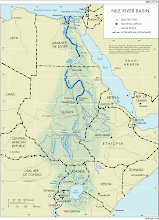Ethiopian stake on the Nile

Why self-pity? Why the insistence of
One can carry several research and analyses to understand how
Let’s see the geography… multiplicity of highlands, dramatic gorges, small plots of land, overpopulated highlands and underpopulated lowlands. Let’s see the economics... agricultural economy, rainfed agriculture, low trade, economy of war during 30+2 years. Let’s see politics… war as a priority, underdeveloped economy, famine crises with political consequences, lack of investment in public works, including water infrastructures. Well… we could continue to find the internal reasons for the failure of
But the question keeps being…. Why self-pity? There are ways of starting to use the water… it is happening already and it will happen in the future, with or without governmental decisions and actions. When there is scarcity, there is vulnerability; therefore there is adaptation (resilience) or non-adaptation (contestation). If I was an anthropologist I would probably go to study how at the local level the different social groups deal with water uses and strategies to manage the water resources. Although, the level to be taken into account here is the regional level, or the Basin level if it sounds better! Therefore it is important to focus on how international political economy influences the water politics in the
Indeed the designation of this course is Hydropolitics, but I do not really think that there is something that we can call hydropolitics… hydropolitics exist in the wider context of the international and regional power relations. Thus, if hydropoltics exist they are submersed in wider geopolitics… the water is one element among others, and maybe not the most relevant. Although it is important to keep in mind that water is firstly and foremost a political resource!

No comments:
Post a Comment